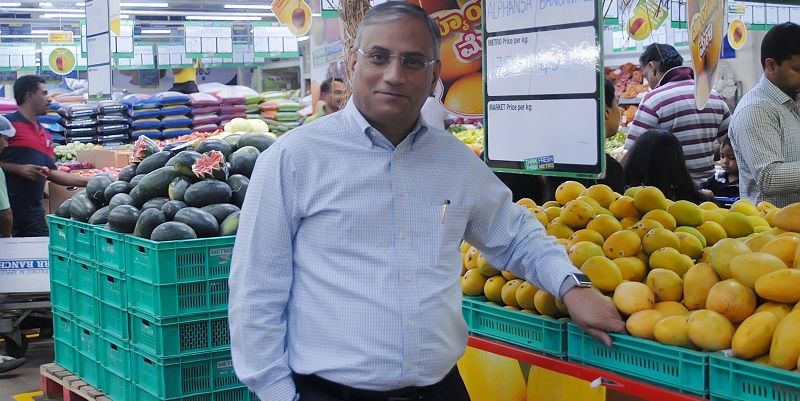India’s future is in job creators, not job seekers: Arvind Mediratta, MD, Metro Cash and Carry
With 50 million SMBs, of which 12 million are mom-and -pop retailers embracing a digital revolution, Metro Cash & Carry MD Arvind Mediratta says India is a great market and Metro’s statement of purpose is being the champion for independent businesses.
It is not always easy to be a CEO in the retail business in India. Especially because it is an industry that touches the nation's emotions in terms of job creation, prices and quality. It even knocks on the doors of politics.
But Arvind Mediratta, the CEO and MD of Metro Cash and Carry, the Indian arm of the 35 billion euro German retailer Metro AG, has steered the company into a country on the cusp of a digital revolution, one where startups and physical retail stores are learning the power of data to win consumers.
Metro C&C been in India for close to 15 years and has integrated itself with the challenges the country has thrown at it. From working with local retailers and farmers to meat/fish suppliers and professionals, Metro has 2.5 million SMBs on their platform. In India, the company is at more than 800 million euro in revenue but does not want to disclose numbers. Arvind strongly believes India’s future is in entrepreneurship, and offers YourStory his take on entrepreneurs beyond the technology world. Edited excerpts from a recent interview:

YourStory: Metro underwent changes globally; would you like to tell us what they are?
Arvind Mediratta: Metro has been through several changes in strategy and direction in the recent past. We had a split about seven to eight months ago. It’s a demerger. We have Metro Company, Metro AG; it is a wholesale and food specialist company. If you go to Europe, there is a chain called Media Mart and Saturn, which is being hived off into a separate company. Globally we did this because the company realises that food and electronics are better as their own businesses.
YS: You are very big in India with a reach close to 2.5 million SMBs?
AM: In India, we are basically a wholesale company, B2B-focused business where 100 percent Foreign Direct Investment is allowed. Our statement of purpose is being the champion for independent businesses and I think India is a great market for Metro to be in. I say so because India is a land of small and medium-sized businesses. In India, there are more than 1.2 crore or 12 million grocery stores or kiranas, not retailers. These are only kiranas. Then there are 1.3 crores or 13 million small and medium-sized HORECA businesses, which are hotels, restaurants, and catering SMBs. The remaining 2.5 crores or 25 million is what we call SCOs - services, companies and offices. This includes what we called self-employed professionals.
The reason I am making this point is that after agriculture, the second largest livelihood for people in India is their own business.
YS: What are your thoughts on the government's push towards becoming an entrepreneur rather than a job seeker?
AM: This is so relevant if you look at the current situation in India. The single biggest flak the country is facing is jobless growth. Now the government is saying we don’t want people to be job seekers but job creators. The jobless growth is happening because everyone is seeking jobs in the formal sector. No wonder the government wants to push entrepreneurs.
At Metro, we want to champion small business and I think in India people are obsessed or crazy about IT startups. But there are so many businesses beyond tech startups. Not everyone has the knowledge or the skill set to set up an IT startup. You need to be a highly skilled engineer. Metro plays an important role in creating and discovering new brands and entrepreneurs. In retailing, you don't need to be a graduate. One can set up a small shop and Metro will help them scale their business. If an entrepreneur wants to set up a small restaurant, we can help them with that. So what Metro is trying to do is in line with what the Government of India is trying to say: “Don’t be a job seeker, be a job creator.” Our purpose is very relevant to the country and we are very proud of that.
YS: Why should small business come to you?
AM: First of all, we are a one-stop shop for everything you want to buy. If you look at a small kirana or mom-and-pop shop, they have to deal with 100-plus suppliers such as Unilever, Coke, Nestle, Parle and Britannia to name a few. They keep essential commodities like stationary, rice, spices, and pulses. There are 50 or 100 brands that they have to handle. They have to go to distributors or suppliers independently; we free small businesses from that trouble.
Then we offer lowest prices because of our bargaining power with all the big brands. Third, is quality, especially in commodities. Right now, there is a lot of adulteration in spices, lentils, and rice. In some parts of the country, even plastic is added to the rice. So food adulteration is a big problem. Being a German company, we are paranoid about quality. This is the reason why a kirana store will come to us. Why would a restaurant come to us? What do they buy? They buy fruits and vegetables and meat. If you see the store, we have best-in-class meat department and seafood department. We sell cold cuts, we sell pork. We sell everything that they need. We are also providing a platform for small and medium sized-suppliers. They are a lot of women entrepreneurs who are getting on to the Metro platform.
YS: Retail in India is largely brick and mortar. Do you want to talk about technology, working capital loans, and SMB retail?
AM: Currently all SMB entrepreneurs still want a face to deal with. They want specialised, customised, and personalised service. So we have a sales team that caters to these larger businesses. Relationships are very important in India. Tech also has a role to play; SMBs told us it is not always possible for them to come to the store to shop. They wanted our salesperson to take the order, collect the payment, and deliver the order. Our sales person gets all this done on an app and tablet.
The whole transaction takes place without coming to the store. We facilitated this from last July. So in all our 24 stores, our sales team is taking the order for SMBs on the field. The payment can happen through multiple ways. It can happen through cash, which was the preferred mode before demonetisation. Now they are using digital wallets. They are transferring money to our bank accounts, RTGS, and paying through credit cards. For small shopkeepers and hotels, we are also offering working capital loans.
We have tied up with a company called Capital Float to offer SMBs short-term loans of a month. Earlier they were not getting loans from the banking sector because of the lack of documentation and it was a very tedious process for SMBs. Capital Float has helped several SMBs in our portfolio by looking at the UID, Aadhaar, or company PAN number. They do verification online and the SMB submits online. This process happens in a jiffy.
YS: How long have these processes been in place in Metro?
AM: We have set this up since the last three-four months. The first thing in retail is we have to solve capital credit. We have tied up with Kotak Mahindra Bank, which offers 14 days credit. In the case of larger hotels and shops, we even extend to 30-40 days credit. What do the SMBs want? They want quality products, lowest possible price, and doorstep delivery. Most importantly, they want credit. So, we are providing all that. They also want to be educated on new product launches. This is another interesting point.
Let’s now look at the life of a small shopkeeper in India. Their life is very boring because of long hours spent in one small space. They live in a joint family set up and all they do is go to their shop in the morning; they sit there the whole day. The only source of entertainment is a TV. In a shop, they are watching cricket or news, while they work and then they go back home. They have one weekly off. They spend some time with their family. No one is bothered to teach them how to run their businesses better and scale up. So, we are treating them like customers. We are trying to understand their problems. The biggest concern was what will happen to my business because of these ecommerce companies?
YS: Did ecommerce have an impact along with GST and demonetisation?
AM: Ecommerce companies are losing billions of dollars in the country. They are buying at 100 and selling at 90. SMB retailers come to us and they can’t afford to keep pace with that. They ask us if we can help them. In line with our motto of being a champion for independent business we help them with several things as mentioned earlier. Then suddenly a change happened in the form of demonetisation and GST; their cash margins were hurt.
We guided them on GST and worked with 10,000 or more SMBs. We hired tax and IT experts to reconfigure our systems to be compliant with GST. We spent crores of rupees and months getting our systems reconfigured just like Unilever, Coke, Pepsi, P&G, and others. There was one problem, which everyone realised needed immediate sorting. The government expected the smaller companies and shops to comply to GST overnight too. These SMBs had nobody to go to for such a process. So we set up GST kiosks in our shops and helped them with GST filing.
YS: SMB retailers have low margins in this country and India still remains a brick and mortar retailing country?
AM: The margins are around 10-12 percent and they take home about 4-5 percent. This is why we offer 2 percent lower price than distributor or wholesale selling price. A 2 percent better price means 50 percent additional profit for them. Because 4 will become 6 and then that will convert to 50 percent. This is better for their life. We are also working with a startup called SnapBizz and are piloting with a few stores on digital point-of-sale systems. This is a terminal that we have given to kiranas to capture digital sales and also get some dashboards on what is selling and what is not.
We have given them hardware and software and will partner with a lot of startups in this space in the future. The kiranas can print GST-compliant invoices with this digital PoS system. They can run their small shop like a retailer. They can do special promotions for high-value consumers. Currently, they were keeping the same price for everyone. If you go to a mom-and-pop store there aren't many promotions. But in the system they can take email ids, phone numbers, and track consumer loyalty too. They can send text messages and emails for promotions. We are telling them that you can run your businesses much more efficiently. They can monitor their sales and profitability. About 100 digital kiranas have been launched in Bangalore and Kolkata.
We can make it work with startups and technology because we have the knowledge and we understand the problem of the customers in retail. They first have to trust technology. The first question they ask is why should I believe you. We are not trying to sell them a product; we are with them in a journey. Right now we have given these 100 machines free of cost. We tell them that we are successful if you are successful. If you guys go away, our business model also goes away. Our ultimate goal is to save their inventory and sales information with our backend and help them scale up. So if they are falling short of any item, or if the safety level is being breached, replenishment can automatically happen through our system.
YS: Your thoughts on Digital India and SMB retail?
AM: The first priority for SMB retail is to convert to digital in order to connect with consumers. If I get an SMS from my local kirana store, why will I go to Grofers or BigBasket? I can buy locally. So the SMBs have to become relevant for the modern customer. We want to digitalise the entire ecosystem. More than data, it comes from what our purpose is. We want these guys to thrive. Imagine 50 million digital SMBs; it's a journey.
YS: What did you do for the cultural transformation of Metro in India? What do you believe is necessary for an entrepreneurial spirit in all of us?
AM: We firmly believe a company’s culture is driven by the guiding principles of the company. For us, our principles are customer success, power of relationships, sustainable business, entrepreneurship, and leadership by example. These are the pillars that govern our conduct as professionals each day in every step we take in the company’s interest. Culture is driven by leaders who have imbibed these principles of the company in their everyday functioning. This transformation is slow and a tedious process. It takes time to reorient several stakeholders, but it always works well when the management puts its full weight behind such an exercise. The outcome is an enhanced sense of ownership and customer centricity in our actions, which is the key pillar of Metro’s principles as a company. We believe we are the champion of independent business.
As far an entrepreneurial spirit is concerned, I believe there are three qualities essential for people to become great leaders with an entrepreneurial spirit. I would define it as head, heart, and guts. Simply put, I say “head” because we need people to think, strategise, and plan effectively for any company’s vision. I say “heart” because all our leaders need to imbibe the ability to understand and connect with people; EQ is as important as an IQ. Lastly, I say guts because every person must have the inherent capacity to take risks, and behave like an entrepreneur or owner and not an employee. All these aspects together create champions and I would define a champion as a person who overcomes obstacles, challenges, and problems, and succeeds in performing consistently. They play to win, and I constantly encourage our people to follow that path.








![[Weekly funding roundup April 20-26] VC investment dips as startups resort to debt capital](https://images.yourstory.com/cs/2/220356402d6d11e9aa979329348d4c3e/funding-lead-image-1669386008401.jpg)


